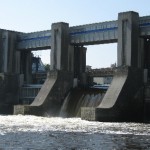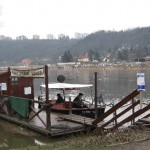
The longest river wholly within the Czech Republic is the Vltava, known to Germans as the Moldau. It rises in the Šumava mountains near the Austrian border and then flows north through the centre of Prague going on further north to join the Labe/Elbe at Melník.
The Vltava was portrayed musically, by the nineteenth century Czech composer Bedrich Smetana, in the second of six symphonic poems that form his symphonic cycle called Má vlast – My Fatherland. Click on this link below and listen to the music whilst enjoying my illustrated guide to the river.
The picture at the beginning of this post is the view most tourist visitors to Prague have of the Vltava, overlooked by St Vitus Cathedral and the walls of Prague Castle. On the river in the foreground, is an ancient paddle steamer, one of the many boats that offer trips on the river through the centre of the city.

Above is a view looking upstream from Letna Park. The second of the bridges is the first and most famous crossing of the river – Karluv most/Charles Bridge.

And here is a view looking downstream from the same spot, with Cechuv most, the bridge in the foreground.

Here is a view of Karluv most/Charles Bridge which, until 1841, was the only crossing of the Vltava within the city of Prague.

This is Ostrov Štvanice/ Štvanice Island – the building located where the river divides is a former small hydro-electric plant. Behind it lies the navigation channel leading to a lock whilst the rest of the river flows over a weir in the foreground.

The Vltava is still used for the commercial carrying of freight, in particular sand and gravel. Large dumb barges are pushed upriver by powerful tugs.

Major engineering works were carried out in the nineteenth century to improve navigation with the construction of locks and new artificial channels to bypass obstructions. This is Podbaba Lock which is located very close to the Chaplaincy Flat where we live.

And here is a loaded dumb barge being pushed upstream, above Podbaba Lock.

Most freight is unloaded here at the wharfs in Holešovice, north-east of Prague city centre.

The Vltava is now increasingly used by private pleasure craft, many of which moor here below the ancient citadel at Vyšehrad, south of Prague city centre.

Beautiful and useful as the Vltava is, like any river, it can overflow and cause serious flood damage. Here is a reminder of past flood levels, reading upwards they mark the floods of 1890, 1845, 1784 and 2002.




Nice posting, Ricky! The music gives it a great dimension! It is still playing as I write this…..so I will wait until it is finished and then hit the send button. Michael and I enjoyed many walks along the Vltava….we are both missing Prague a lot!
Karin – glad you enjoyed it. I thought for once I’d try & add some appropriate music to my pictures. If you & Michael are both missing Prague, when will we see you back here?
Heck Ricky, your pictures are almost as good as your wife’s! I love Bedrich Smetana’s “Ma Vlast.” One of the coolest things about it is that all the Czechs know it and can share it together. Even though we have similarly patriotic and beautiful pieces of classical music in America that express the American ideal, not all Americans would know those pieces. This is a cultural ideal and to be treasured!
Hi Karen – Thank you for the compliment regarding my pictures 🙂 Má vlast is one of the wonderful expressions of the Czech National Revival in the nineteenth century and Vltava is a beautiful portrayal of the river that I never tire of listening to.
What a lovely post, Ricky – a great mix of music and words which brought back some happy memories. I remember looking at some of the flood level markers on Kampa Island and marvelling at the huge height the flood waters had reached.
Glad you enjoyed it Perpetua – It was your various recent posting of You Tube musical videos on your blog that inspired me to do the same 🙂 So do take the compliment!
Beautiful pictures! I love shots of scenic bridges over rivers. Did you take these yourself or did you find them online?
Thank you Pearl, for your compliment. They are all mine otherwise it wouldn’t say ‘© Ricky Yates’ under each of them 🙂